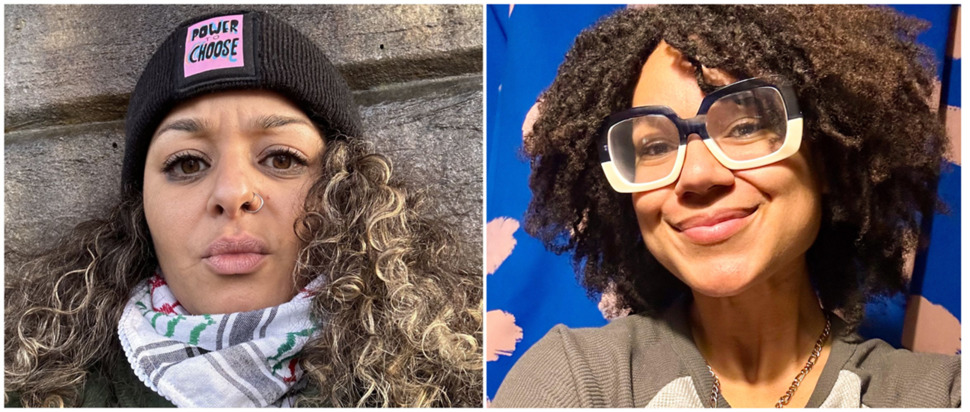layla-roxanne hill and Francesca Sobande on their book Look, Don't Touch
We chat with layla-roxanne hill and Francesca Sobande, the authors of Look, Don't Touch, about the politics of feeling in contemporary society
The latest of 404 Ink’s Inkling series to hit shelves, Look, Don’t Touch: Reflections on the Freedom to Feel by layla-roxanne hill and Francesca Sobande explores connectivity, emotions, (im)mortality, boundaries and the language of ‘okayness’ embedded in our day to day lives. The book grew from “conversations in many different forms… cards, letters, WhatsApps, audios, long telephone calls and even a Skype phase,” hill and Sobande say – conversations between them that span years of friendship, enhanced by the contours and confusion of the COVID pandemic as connection shrank online. This period prompted them to focus on “acknowledging and sitting with the messiness of life” in a way that felt generative and expansive.
The pair started looking at public signage, such as the ‘Look, Don’t Touch’ signs that lend their name to the book. Questioning the double entendre behind the wording of signs and the intended recipients of the messaging, hill and Sobande began to think about the commanding nature of street signs and their emphasis on public appearance and morality which contributes to isolationist mindsets.
“One of the things that comes to mind,” Sobande says, “was around two or three years ago when we met in a café and were speaking about the particular signs that had cropped up on streets during that time, and how COVID was being used to legitimise ways that governments and public bodies were trying to make it more difficult for people to exist in public spaces.
“I think we wanted to try and embrace some sense of freedom in the process [of writing],” Sobande adds. “We wanted to grapple with the specifics of exactly what is happening in different spaces at this point of time. How in some ways, nothing right now is unprecedented, despite how it’s discussed.”
The pair employ a multi-media approach, flitting between music, culture, film and television references to explore ways of feeling – how softness and hardness can be felt together in the work of Gothicness, Black Metal and Nu-Metal music, for example, and how media can create spaces of reflection and visibility. Towards the end of the book is a playlist of the songs they listened to over the course of writing, and their experiences of neurodiversity when it comes to writing are centred throughout. Inviting the reader to come and go from their pages in a similar style, hill and Sobande stress that both their writing process and its reception need not be linear. “It doesn't matter if [the readers] don't read all of it,” hill adds. “It doesn't matter if they read some of it. You know, even if they just look at it – we're happy about that.”
Central to the book is how technology serves as both barrier and broker to communication, the hypocrisy of microtrends underlying the paradox of online connection and the (lack) of freedom in society to feel. “Everybody's always rebranding,” says hill. “That's not new. But now it seems that there has to be a particular way in which you have to rebrand, be that through a Brat summer, be that through a Rat Girl summer, be that through Clean Girl or Mafia Wife or one of the many, maybe billions of microtrends that there are.” The irony of the illusion of uniqueness embedded within microtrends, echoed multiple times on social media, highlights the pursuit of online connectivity and the fallacy it ultimately pedals. This clamour for connection across screens that the pair unpick points to the inherent consumerism placed within ideas of ‘rebranding’ and identity.
Above all, the pair emphasise embracing and acknowledging feelings of confusion. ‘Okayness’ takes many different forms, as hill says: “The platform-itsation of existing and being involves this pressure on writing streaks or keeping up your daily routine of learning this or that, or tracking your number of steps.” Look, Don’t Touch encourages readers to pause in the pursuit of okayness which as Sobande points out, means “you lose sense of that space for curiosity and experimentation and dreaming, which I guess we've tried to include as part of this.”
The phrase, ‘it's okay to not be okay’ is discussed at some length. “If the sentiment contributes to [people] feeling more able to open up about struggles, we wouldn't want to be dismissive of that,” Sobande says, “But for many, a lot more is needed materially and structurally to support them and address systemic reasons.” hill and Sobande explore how “the idea of okayness feels restraining. It can be weaponised to not only distract from, but to deny the structural realities of genocidal actions, racism, sexism, transphobia, ableism, capitalism, and so much more.” Their book explores how billing okayness as a model of social value can be detrimental and reductive. hill continues: “I think it can also be part of very oppressive political projects to create revisionist accounts of history and to deny violences that are happening right now.”
Look, Don’t Touch is a small window and testament to the friendship of layla-roxanne and Francesca. Their work disentangles the hypocrisy embedded in many forms of technological connection that ultimately create distance between users – a start but certainly not the end of a conversation that still has many corners left to explore.
Look, Don't Touch is out on 20 Feb with 404 Ink
